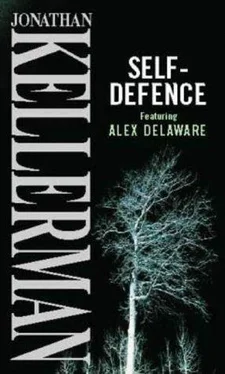She frowned. Her forehead knitted.
"Nothing more," she said, opening her eyes. "But it doesn't seem weird anymore- being up there and not remembering. It's as if I'm getting in touch with my own history."
I thought of the nanny Ken had mentioned. Enough for one day.
"When can we do this again?" she said.
"I can see you tomorrow. Two o'clock at my house."
"Great."
"In the meantime, I assume you want me to ignore Lowell's invitation."
I expected a quick reaction, but she put her finger to her lip and thought. "I guess the only reason to talk to him would be to find out what he's up to. And maybe I should do that myself."
"That's a lot to bite off, right now," I said. "If you want to scope him out, I could listen to what he has to say and report back to you."
"Believe me, I'm not rushing off to have a tête-à-tête with him. But if I send you to represent me, that'll just show him I'm weak."
"He already knows you're seeing me. And why should we care what he thinks?"
"True," she said. "But I don't want anything to do with him, directly or indirectly. I'd rather put my head in the oven- just kidding."
We went back into the house.
"You know," she said, "maybe I'm being too rigid. I guess it would be okay for you to meet with him if you think it could do any good."
"I can't promise you it would."
"Are you interested in meeting the Great Man?"
"I'm interested in meeting someone so destructive."
"A psychological specimen, huh?"
That wasn't what I'd meant, but she went on.
"Putting him under the microscope- okay, go ahead. Meanwhile, I'll concentrate on relaxing. Getting comfortable with my unconscious."
***
I was surprised to find Robin and Spike home.
"The electricians didn't show up," she said. "The truck broke down."
"Probably in the parking lot at Dodger Stadium."
"No doubt. I left the drywallers there, figured I'd get some work done here, and then maybe you and I could go out and have some fun."
"Fun? What's that?"
"I think it's something the Chinese invented. They invented everything, right?"
She put her arms around my waist and her face against my chest.
"Actually," she said, "I'm glad the turkeys flaked out. I've been thinking about how little we've seen of each other lately."
"When it's all done," I said, "let's go away somewhere."
"Where?"
"Some remote island without phones or TV."
Something bumped my ankle. I looked down and saw Spike staring up at us. He cocked his head and snorted.
"But with air-conditioning for the pooch," I said.
Robin laughed and bent to pet him.
He began breathing hard, then rolled over on his back, paws up, offering his beer gut. As Robin scratched him, he grumbled with pleasure.
Once in a while, things are simple.
At nine-thirty that evening they got complicated.
We were watching a bad old movie, laughing at the dialogue, when the phone rang and Milo said, "There's someone I thought you might like to meet. Right in the neighborhood, actually."
"My neighborhood?"
"Must be. I see the ocean." He gave me a name, then an address in Paradise Cove.
"Oh."
"Trailer park, right near the Sand Dollar."
"Are you there now?"
"Actually, I'm at the Sand Dollar bar- is this a bad time?"
Robin sat up and mouthed, "Patient?"
"Milo," I told her. "He's got someone he'd like me to meet."
"Now?"
I nodded.
"Go," she said. "But definitely no phones on the island."
***
The road down to the cove was unlit and hemmed in by hillside and sky. The guardhouse was empty and the gate was up. Beyond the Sand Dollar lot, the ocean was a tight stretch of black vinyl. The lot was nearly empty, and the restaurant's neon sign was suspended in the darkness.
I turned right and drove up a short steep road to the trailer park. The mobile homes were stuck into the sloping terrain like metal studs in leather. To the left was a small flat parking area atop a low bluff. Rick's white Porsche 928 was parked there and I pulled in next to it, under the grasping branches of a huge pittosporum tree.
The units were numbered in a system that defied logic, and it took a while to find the address Milo'd given me.
I climbed nearly to the top of the park, walking on asphalt paths lined with rock and seashell borders. Most of the trailers were dark. Blue TV light seeped from behind a few curtained windows.
The address I was looking for matched a white Happy Tourister with aluminum siding and a bolt-on carport. A barbecue sat in the port. Geranium ivy grew around the wheel wells.
Milo answered my knock. A short, solid-looking woman in her mid-sixties stood behind him. Her hair was tinted the color of ranch mink and permed, and she had a small square face and searching dark eyes. She wore a pea-green sleeveless blouse and stretch jeans. She wasn't fat but her arms were heavy. Eyeglasses hung from a chain around her neck.
Milo stood aside. The trailer's front room was a gold-stained pine kitchen with a brown linoleum floor and white Formica counters. It was sweet with the smell of baked beans.
The woman met my smile with one of her own, but it seemed obligatory.
Milo said, "Mrs. Barnard, this is Dr. Delaware, our psychological consultant. Doctor, Mrs. Maureen Barnard."
"Mo," said the woman holding out a hand. We shook.
Milo said, "Mo was married to Felix Barnard."
The woman acknowledged the relationship with a sad look and led us into the living area. More pine, gold carpets, a quilted white sofa specked with gold, and a matching recliner. Big TV and a very small stereo. The place was immaculate.
Mo Barnard took the recliner and Milo and I shared the couch. The ceilings were very low, and Milo's bulk made the room look even smaller than it was. On the coffee table was a year's worth of Reader's Digest along with a thick bound stack of supermarket coupons and a sandpiper carved out of driftwood. Next to Mo was an octagonal pressed-wood table bearing a remote control and a cut-glass bowl of miniature candy bars: Hershey's, Mr. Goodbar, Krackel. She picked up the remote and put it in her lap, then handed the bowl to Milo.
Unwrapping a Mr. Goodbar, he said, "As I told you, it was Dr. Delaware who got us involved in the case that led us to look into your husband's death." To me: "Mr. Barnard was murdered a year after Karen Best disappeared."
Mo Barnard was looking at me.
"I'm sorry," I said.
"Quite a shock when it happened," she said, "but it's been a long time. Strange to be hearing about it after all these years, but you never know, do you?"
Despite living at the beach, her skin was white and putty-soft. Her eyes had the flat, dark cast of a Grant Wood matriarch. She fingered the remote control and looked at the blank TV screen.
Milo gave me the candy bowl.
As I unwrapped a Hershey bar, he said, "Felix's killer was never found. He was shot in a motel on La Cienega near Pico. West side of the boulevard."
La Cienega was the border between Wilshire Division's jurisdiction and West L.A.'s. The west side of the street made it Milo's territory.
Mo Barnard sighed. Milo smiled at her, and the way she reciprocated it let me know he'd been here with her for a while.
"Strange," she said. "All these years. I thought he was with a whore, didn't know whether to be sad or mad. After a while, I forgot about that part of it. Now you come and tell me it could have been something else. You just never know, do you."
"Just a possibility," Milo reminded her.
"Yes, I know, it'll probably never be solved. But just the chance that he wasn't with a whore cheers me up a bit. He wasn't a bad guy- lots of good qualities, really."
Читать дальше












